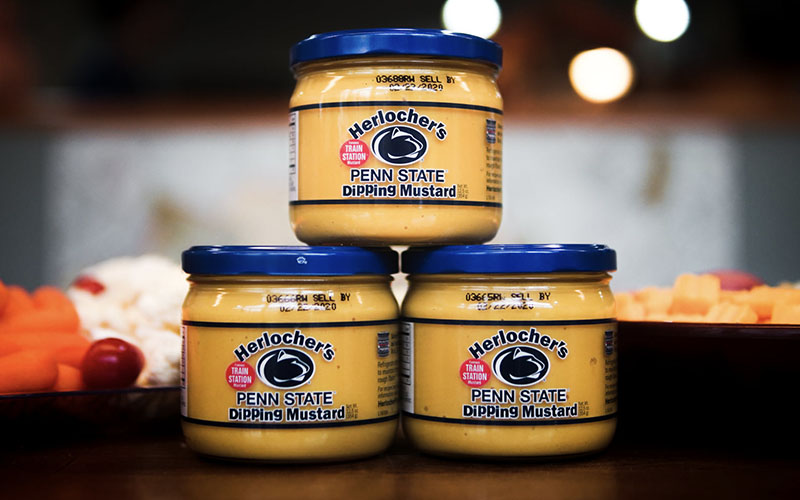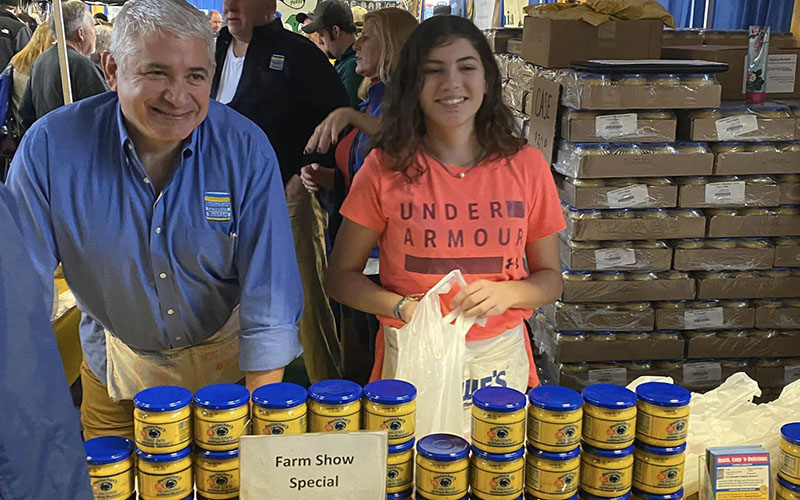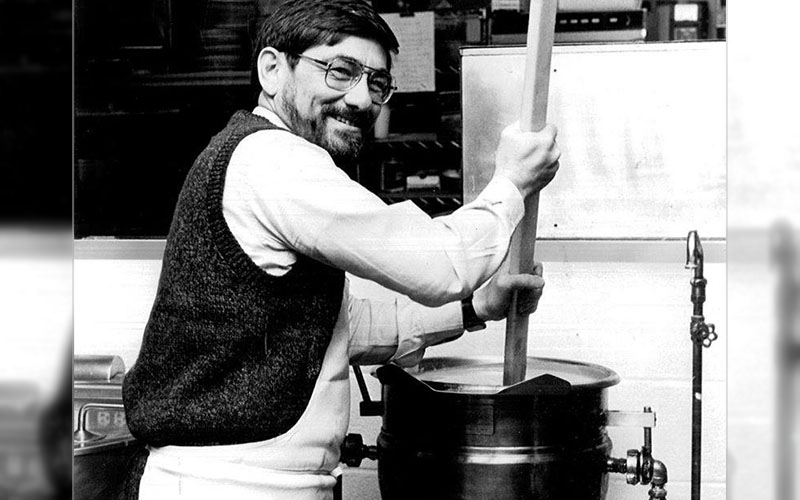By Stephanie Kalina-Metzger

Most Penn State alums — or anyone who’s spent even a small amount of time in Happy Valley — know Herlocher’s Dipping Mustard. The bright yellow mustard stands out through the glass jar emblazoned with Penn State blue and white. However, while the brand is irrefutably tied to Penn State, its reach now stretches far beyond.
You can find Herlocher’s Dipping Mustard in 15 states and 4,500 stores. At a single event, the Herlochers — who, yes, still operate the family-run business — can sell thousands of the little jars. Even when the Herlochers’ original restaurant, The Train Station, simply gave the mustard away with pretzels, they’d go through a literal ton of pretzels per month just to keep craving customers fed.
We love the sense of community, the energy and how much Penn State and State College have to offer. We can’t see us living, or moving our core business, anywhere else.
The Herlochers can recognize how Penn State and Happy Valley in general have played a big role in their success, from the time they launched their endeavor and even into recent times, with new business challenges like the Covid-19 pandemic — and that’s why they’re keeping their business headquartered here for good.
 The Herlochers set up their stand at the 2023 Farm Show, where they went on to sell 5,400 jars of their mustard in one week.
The Herlochers set up their stand at the 2023 Farm Show, where they went on to sell 5,400 jars of their mustard in one week.
From bar food to big business
Penn State alums who attended the university the 1970s will likely remember the Herlochers’ first business endeavor, The Train Station restaurant located on East College Avenue. There, Chuck Herlocher, using a family recipe, created what we now know as Herlocher’s salt-free, fat-free, gluten-free mustard. He served it for free, alongside pretzels, at the restaurant’s bar.
However, it was a Penn State alum that pushed the condiment from bar food to big business. Chuck received a $20 bill in the mail, from a Penn State student who had moved to Southern California, that read, “Dear Mr. Herlocher, I lived on your dipping mustard in college. I cannot live without it; please send me whatever this gets me.”
It simply became logistically prohibitive to maintain the 50 collegiate labels, so we returned to the one nearest and dearest to our hearts, Penn State.
According to Herlocher’s co-owner Sharon Herlocher, Chuck was so touched by the note that he began bottling the product and selling it at the hostess stand.
As soon as the mustard became available at the hostess stand, though, word spread fast and customers throughout the Northeast began asking for it. “Next, the grocery stores came calling,” Sharon said.
Not long after, those grocery stores began requesting that Herlocher’s give their local universities the same love showed to Penn State.
“We decided to really tap into sports fans nationwide, ultimately creating 50 different collegiate labels,” explained Sharon. However, now, Herlocher’s only offers one collegiate label on its jars, the original Nittany Lion label that the brand started with. “It simply became logistically prohibitive to maintain the 50 collegiate labels, so we returned to the one nearest and dearest to our hearts, Penn State.”
Today, Chuck’s son Neil Herlocher is president of the operation, as has been the case since 1994.
 Founder Chuck Herlocher whipping up a batch of Herlocher’s Dipping Mustard in 1978.
Founder Chuck Herlocher whipping up a batch of Herlocher’s Dipping Mustard in 1978.
An enduring fanbase carries the brand through tough times
As was true for many companies throughout not just Happy Valley, but around the world, the Covid-19 pandemic brought along unique business challenges for Herlocher’s. Once again, the brand found that, just like it was Happy Valley community and Penn State alumni support that helped launch the business, that same support would carry the brand through tough times.
“When COVID hit, our glass supplier of 40 years wouldn’t sell us glass because they were prioritizing larger companies, so we had to maneuver and delay orders,” Sharon said.
And then there was the egg issue. Herlocher’s primary ingredient is eggs, so costs increased as well.
“[With] the combination of the pandemic and inflation, our costs of production — raw ingredients, packaging materials and labor — went up 40% or more,” said Sharon. “We, like many, had to rework our processes, and the outcome was that we were able to pass along a lower, 30% increase to customers.”
Despite this, Sharon said the Herlocher’s fan base has been understanding and supportive and Herlocher’s couldn’t imagine operating their business anywhere other than in Happy Valley.
“We love the sense of community, the energy and how much Penn State and State College have to offer,” said Sharon. “We can’t see us living, or moving our core business, anywhere else.”





